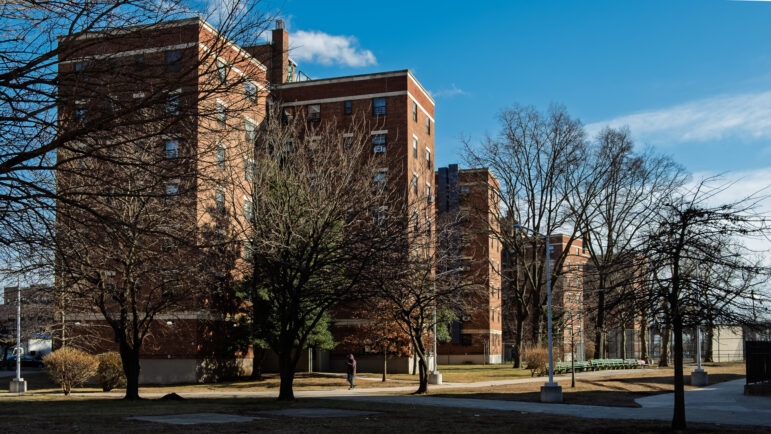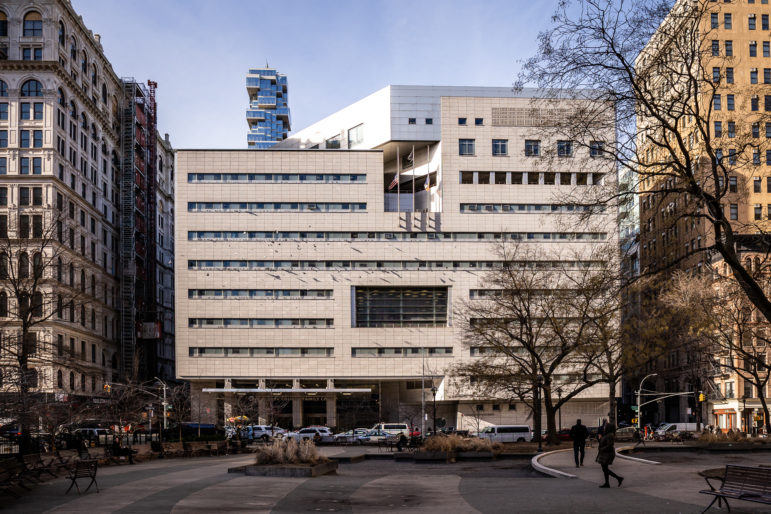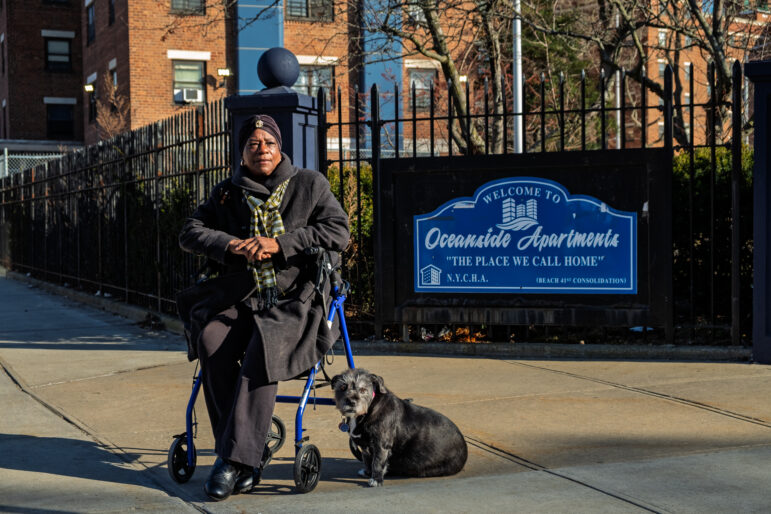In the middle of the summer of 2006 City Councilman Eric Gioia was standing in the lobby of City Hall looking noticeably less well-groomed than he usually does. When a reporter asked him how he was, he sighed and shook his head. “I’m just trying to get someone to pay attention to what’s going on in my district,” he said. Large swaths of northwestern Queens had been without power for a few days during a heat wave. In the weeks that followed, as the media chronicled the failings of Con Edison and the suffering of Queens residents, Gioia got a lot of attention paid to his district as he became a daily presence in the media.
~
For Gioia’s admirers and detractors alike, it was a moment to savor. There was Eric Gioia, the articulate spokesman for the little guy, standing up to a bungling big business being defended by the wealthy mayor. Or, there was Eric Gioia, the unabashed publicity hound, chasing headlines and flashbulbs with over-earnest sound bites.
This September, Democratic primary voters will decide whether either Eric Gioia the crusader or Eric Gioia the publicity addict—or some combination of both—ought to become the city’s next public advocate. In the most recent Marist Poll, Gioia is running last in the field of four, which includes fellow Councilman Bill de Blasio (whom City Limits profiled here), former public advocate Mark Green and civil liberties lawyer Norman Siegel. But Gioia has already raised more money than any public advocate candidate in history and says he is putting together an unprecedented volunteer network to win what many predict will be a low-turnout primary.
“Part of what I believe is if you engage people, you can—block by block—change the city,” the 36-year-old candidate explained in mid-May at a coffee shop in Long Island City, a neighborhood he represents along with Astoria, Maspeth, Sunnyside and Woodside in City Council. “The overarching idea is getting people to believe again that government can do better.”
The public advocate, an office unique to New York City, is technically the number two citywide official, meaning he or she takes over if the mayoralty is vacated. But the office’s true purpose is to collect citizen complaints, investigate city agencies and offset the power of the executive branch in New York’s strong-mayor system. It’s a vague set of duties on which each 2009 candidate is putting his own spin. Gioia’s take is that the public advocate ought to be an arbiter of social justice. “The job of public advocate is to find people who need somebody on their side and stick up for them any way you can,” he says. “And not just to yell and scream, but to deliver measurable achievements.”
Ambitious climb
He comes to the job, he says, from his own working-class background – witnessing the struggles of his parents, who ran a flower shop in Woodside, not having health insurance as a kid, working his way through New York University as a janitor, nearly flunking out, and then working through Georgetown Law. He clerked in the White House deputy counsel’s office, and after passing the bar practiced law at the Manhattan firm of Milbank Tweed Hadley McCoy. Then he ran for the City Council’s 26th District seat, which was also being sought by four other men—one of whom, Matthew Farrell, had the support of the Queens County Democratic organization.
By all accounts that 2001 Council campaign got nasty. At one point, a flyer circulated about Farrell getting arrested in 1988, when he was 17; the flyer advocated a vote for Gioia. Gioia and another candidate in the race, Queens Community Board 2 chairman Joseph Conley, accused one another of producing the flyer, which became an issue in the campaign. “We challenged him to a lie detector test that he refused to take. All of a sudden Eric Gioia was too busy to take the test,” says Conley. Gioia says he called on the Queens district attorney to investigate and claims that, in a phone conversation, Farrell (who has since died) said he did not think Gioia was responsible.
Gioia won a solid victory on primary day, earning 43 percent of the vote, beating his nearest competitor by 2,900 votes out of 11,400 cast. In the general election, he beat his only opponent—a Green Party candidate—by a 14-to-1 margin. Conley says Gioia then tried to have him removed from the community board. Gioia contends he never directly asked for Conley’s removal.
Once on the Council, Gioia got to work advancing his priorities. Today he points to achievements like writing the Young Adult Voter Registration Act, which requires city schools to provide to each graduating high school senior a postage-paid voter registration form. He’s also advocated for the city’s budget to include money to reimburse school teachers for supplies, conducted investigations that helped shape the city’s emergency contraception law and passed legislation providing incentives to private developers to create middle-class housing in Queens. In 2005, he authored a bill that would permit people to apply for food stamps online; it survived a mayoral veto to become law.
Gioia says friends in his district warned him early on that his liberal record—refusing to march in the Manhattan St. Patrick’s Day parade because it excluded gays, breaking with many Queens colleagues to back a 2003 resolution opposing the Iraq war—could be a liability in the neighborhoods he represents. But Gioia was reelected easily in both 2003 and 2005.
Gioia’s Council committee work has centered around the panel he chairs, Oversight & Investigations, which according to a Citizens Union tally held fewer hearings—a mere six—from 2006 through 2008 than any other Council committee. Gioia, who is a member of seven committees and one subcommittee, is often seen making very late and very brief appearances at Council hearings.
“You try to be at all the hearings, especially the important ones. The truth is, I try to spend as much time as I can outside of City Hall—in the neighborhoods, talking to folks,” Gioia says. He notes that the Oversight committee is exempt from a requirement other panels face to hold a hearing every month, because his committee’s work is different. “The nature of investigations is not to have hearings,” he says. “We release reports instead.” In the past year, Gioia’s committee has released findings on topics like milk price gouging and the lack of banking services for public housing residents. Gioia’s 88.74 percent attendance rate for hearings in 2008 ranked him 27th out of the Council’s 51 members.
When the Council voted by a fairly narrow margin to support congestion pricing last year, Gioia was one of the ayes. Though Gioia says he expressed nuanced views on the issue over the months of debate on it, his Council colleague Tony Avella has suggested that Gioia cast his “yes” vote to curry favor with Mayor Bloomberg and Council Speaker Christine Quinn. Gioia, who says the pricing scheme was “wildly unpopular” in his district, contends that “my position was very consistent”: He had concerns about the impact of the plan on lower-income people that were partially addressed by amendments the mayor made to his plan as the vote approached.
From 2006 through 2008, according to Citizens Union, Gioia cast 30 “no” votes on the Council. Only nine of his colleagues broke with Quinn more often.
In 2007, the Council voted to landmark a section of Sunnyside Gardens in Queens after a bitter fight in the neighborhood over the plan, which some thought was an essential defense against overdevelopment and others worried would impose high costs on middle-class homeowners. Gioia came out in support of landmarking shortly before its passage. In an e-mail to constituents, he wrote that Sunnyside Gardens is “the neighborhood I’ve chosen to live in with my family and where I plan to raise my daughter.” But Gioia’s home is actually just outside the landmark district—a fact that he alluded to in the same e-mail, but that some in the district thought he glossed over.
There were other complaints about how Gioia handled the controversial issue. “I think one of the good things Eric Gioia did was he [distributed] a survey asking people what they wanted preserved,” says Ira Greenberg, a local lawyer who opposed the landmarking. But the survey’s results were never publicized. “It would have been good to see the results,” Greenberg added. Gioia’s aides say the survey was not a yes/no questionnaire and that it revealed that the district was sharply divided over the issue.
~
All in the delivery








